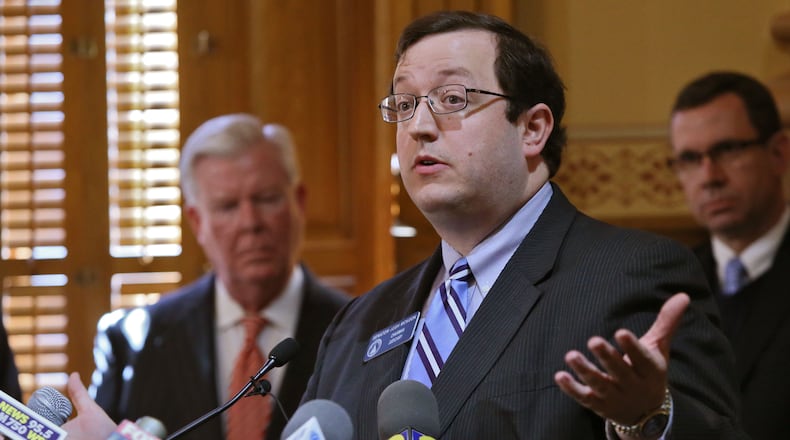Chances of yet another fierce battle over "religious liberty" legislation in the state Capitol dropped significantly on Thursday evening, as members of the Senate Republican Caucus made a decision that is likely to cost one of the measure's principle backers his leadership position.
We’re told that, at a private meeting at the Capitol City Club in downtown Atlanta, Republican senators overwhelmingly agreed to merge the chamber’s two judiciary committees into one. Only two senators were said to oppose the merger at the closed-door meeting.
In past sessions, the Senate Judiciary Committee has handled matters of civil law, while a separate one focused on criminal concerns. The chairmanship of the new, merged committee is likely to go to Jesse Stone, R-Waynesboro.
If that’s the case, Josh McKoon, R-Columbus, who had been chairman of the judiciary committee that oversaw civil matters, would be left out in the cold.
For the past three sessions of the Legislature, McKoon has been an uncompromising supporter of “religious liberty” legislation designed to shield conservative Christians in the aftermath of the U.S. Supreme Court’s declaration that gay marriage is a constitutional right.
The Legislature passed HB 757 last year, but following strident opposition from the LGBT community and major Georgia business interests, Gov. Nathan Deal vetoed the measure.
The legislation bypassed his Senate Judiciary Committee last year, as did much other legislation, but in 2015, McKoon was able to launch his measure via his chairmanship. Should that no longer be the case, odds of a fight over the issue are greatly diminished.
Deal’s veto isn’t the only obstacle. While Georgia lawmakers debated the issue last year, North Carolina passed a similar measure – and Gov. Pat McCrory signed it. McCrory lost his re-election bid in November to Attorney General Roy Cooper, a Democrat.
Removing McKoon from Senate leadership could also have the benefit of smoothing over differences with the House in the coming session, which begins Jan. 9. McKoon last year had a significant, public confrontation with Speaker David Ralston’s lawyer. Several years ago, the Columbus legislator also pushed through an ethics measure restricting lobbyist giving, over the objections of Ralston. The issue still rankles.
Another sign that the two chambers are trying to cooperate more: The significant scheduling and procedural overhauls we outlined earlier Thursday were largely done in concert with Ralston. And with McKoon, who has pushed to slow down the legislative process, in the dark.
McKoon didn't immediately comment, but this could be a mixed bag for him. Committee chairs don't just carry political clout, but they also tend to attract political donations, which would obviously help his likely run for Attorney General or other statewide office.
But being on the outs with the state Senate could also bolster his insurgent credentials, especially if he plans to revive the "religious liberty" fight again. And this setback could make him even more determined - and more likely to run for higher office.
About the Author
The Latest
Featured




